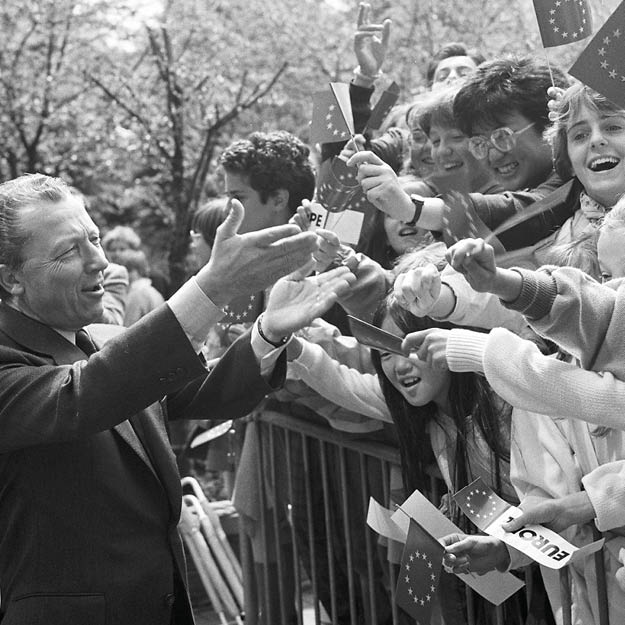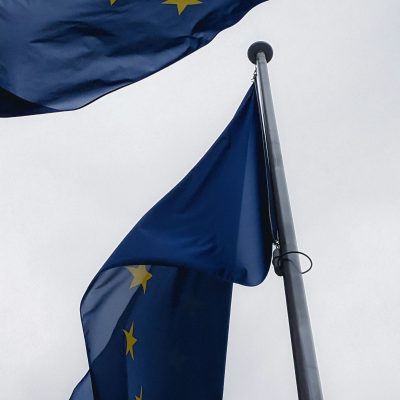Bon anniversaire Erasmus et bon vent!

Les trois instituts Jacques Delors célèbrent cette année avec ferveur les 35 années d’existence du programme Erasmus au cours desquelles 12 millions d’Européens (étudiants, scolaires, apprentis, éducateurs,..) ont pu suivre une formation dans un établissement universitaire ou scolaire d’un autre Etat membre. En 1987 ils n’étaient que quelques centaines d’étudiants dans ce cas. Et d’ici à 2027, ils seront plus d’un million par an. Pourquoi un tel succès, un tel engouement ?
En 1986, quand la Commission a adopté sa proposition Erasmus, la coopération universitaire européenne n’en était qu’à ses balbutiements. Les Etats membres affichaient une méfiance profonde voire une hostilité résolue à voir les Institutions européennes mettre un pied dans les affaires universitaires. On pense aujourd’hui que la création d’Erasmus fit l’objet d’un consensus enthousiaste. Ce fut loin d’être le cas. Et même le contraire. Quand le Conseil des ministres de l’éducation se réunit en octobre de cette année-là, la présidence britannique avait élaboré un accord qui voyait non seulement le budget du programme réduit des deux tiers, mais qui excluait complétement les échanges d’étudiants. Un Erasmus qui ne devait pas concerner les étudiants ! Ce compromis recueillait l’assentiment des ministres. Alerté par mon conseiller à qui j’avais demandé d’assister au Conseil et en accord avec Manuel Marin, le Commissaire européen qui y siégeait, je décidai alors de retirer la proposition de la Commission, comme le Traité m’y autorisait. Ce fut dans l’histoire l’un des rares cas où la Commission dût retirer sa proposition la jugeant dénaturée par le Conseil.
Je demandais alors que les chefs d’Etat et de gouvernement qui devaient se réunir à Londres deux mois plus tard en décembre 1986, sous la présidence de Margaret Thatcher, puissent se prononcer sur l’avenir d’Erasmus. Avant la réunion, en tête à tête avec la Première ministre britannique, je lui dis qu’en cas d’insuccès je serais contraint de devoir regretter publiquement le désintérêt du Conseil européen pour les étudiants et les universités. Au-delà du langage diplomatique, cela signifierait un échec notable du sommet qu’elle présidait. Margaret Thatcher le comprit et les chefs d’Etat et de gouvernement ouvrirent la route pour l’adoption d’Erasmus.
Les trois coups de l’Europe du Savoir étaient frappés. Alors que l’Europe se relançait avec la perspective du marché unique, le dialogue social, le renforcement de sa cohésion sociale – nous allions doubler le budget des fonds structurels pour aider les régions en retard de développement, avec le lancement d’une grande politique de recherche et développement préparée par le programme Esprit, l’inclusion de l’environnement dans le Traité. Il fallait démontrer que ce nouvel espace commun aux Européens était aussi un espace de coopération et de solidarité au-delà des activités économiques concurrentielles.
Et c’est aussi la leçon de cette période. Les Européens ont répondu présents. A chaque fois qu’un champ de coopération a été ouvert que ce soit pour l’éducation ou la recherche, par exemple, les Européens s’y sont investis avec enthousiasme.
L’Europe n’est pas, comme on l’entend parfois une entité abstraite, artificielle, mais une communauté vivante, active. Aujourd’hui la quasi-totalité des universités et centres de recherche en Europe sont impliqués au quotidien dans des actions communes de formation et de recherche. Les centaines de milliers d’étudiants Erasmus sont présents dans pratiquement toutes les universités du continent, recueillant une expérience qui facilitera leur insertion professionnelle et apportant dans leurs amphithéâtres et salles d’études le témoignage de cultures voisines. Se conforte alors le sentiment d’appartenance à une Europe « unie dans la diversité » selon la belle expression de Fernand Braudel.
A une époque où la quête d’identité tourne à l’obsession nationaliste, dans un débat politique français à l’horizon limité et où « l’ignorance » sur la chose européenne devient « encyclopédique » selon le bon mot de Jean Jaurès, rappelons d’abord qu’avec Erasmus, l’Europe renoue avec des racines profondes. La coopération universitaire, la mobilité des étudiants et des professeurs, des parcours communs de formation, des diplômes reconnus par tous trouvent leur origine au moyen âge quand la Sorbonne, les universités de Bologne, Coïmbra, Salamanque…et des dizaines d’autres accueillaient professeurs et étudiants venant d’autres nations européennes. Avec la création d’Erasmus, l’Europe renouait donc avec ce brillant passé.
En souhaitant de tout cœur « bon vent à Erasmus », je voudrais aussi rendre hommage aux Présidents et membres successifs de la Commission européenne qui, sans relâche, ont soutenu Erasmus. Ils l’ont notamment élargi aux apprentis, depuis 1995, pour des mobilités courtes et, depuis 2017, pour des mobilités longues avec Erasmus Pro lancé sous l’impulsion de l’Institut Delors. Aujourd’hui, plus de 185 575 jeunes et enseignants de la formation professionnelle bénéficient des différentes mobilités.
Erasmus a aussi ouvert la voie aux « Universités européennes » qui se développent depuis le lancement de cette idée par Emmanuel Macron dans son grand discours de la Sorbonne. Un prolongement logique et admirable : déjà, en deux ans, 41 universités européennes constituées rassemblant plus de 300 institutions. Et un doublement de son budget pour la période 2021-2027.
Il faut également rendre hommage au Parlement européen, qui a toujours soutenu et défendu ce programme quand certains Etats voulaient le supprimer.
Hommage aussi aux fonctionnaires de la Commission qui pendant des années ont labouré le terrain avec opiniâtreté, convaincu les administrations nationales de l’intérêt qu’elles avaient à coopérer dans le cadre européen, à concevoir ce programme Erasmus avec audace. Ils étaient peu nombreux à travailler sous la férule du Gallois Hywell Jones, l’Italien Domenico Lenarduzzi, le Britannique Alan Smith. Leur travail a fait honneur à leur Institution.
Aujourd’hui, je me réjouis que ce programme d’échange s’apprête à s’élargir encore aux lycéens. Les échanges dès l’enseignement secondaire offriront aux jeunes une première expérience européenne qui ouvriront leurs esprits et élargiront leurs horizons. Nos instituts se félicitent d’avoir soutenu ces initiatives. De même, nous avons plaidé pour que le programme s’enrichisse d’un volet bleu. En effet, si nous voulons que l’Europe protège et restaure son hydrosphère comme le prévoit la mission Starfish et assume ses responsabilités de puissance maritime, nous devons former nos jeunes et les doter des aptitudes et compétences nécessaires.
Oui « bon vent » à Erasmus et puissent les générations futures, nos jeunes Européens, enrichir encore cette belle construction européenne. A eux maintenant d’imaginer et de dessiner l’avenir, comme certains s’y emploient en participant à la Conférence organisée à cette fin. A tous, je leur adresse un salut fraternel.




